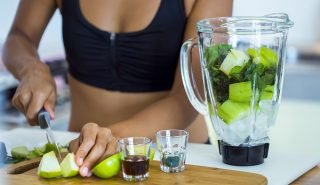Detox diets have risen in popularity over the last few years and are more popular than ever. These diets are supposed to remove toxins from your body, but do they do anything? They’re typically only undertaken for a short period of time but are they worth a try, or should they be left well alone?
What is a detox diet?
 Detox diets are only used for a limited time. Typically, they follow the pattern of strict fasting which is then followed by a strict diet. This strict diet mostly consists of “raw vegetables, fruit and fruit juices, and water”. This is supposed to aid in removing toxins from the body. Some detox diets also include herbal teas, supplements, colon cleanses, and even enemas.
Detox diets are only used for a limited time. Typically, they follow the pattern of strict fasting which is then followed by a strict diet. This strict diet mostly consists of “raw vegetables, fruit and fruit juices, and water”. This is supposed to aid in removing toxins from the body. Some detox diets also include herbal teas, supplements, colon cleanses, and even enemas.
The theory behind this is that fasting will help to ‘rest’ your organs and will stimulate the liver to get rid of any excess toxins. These toxins are released via urine, feces, and sweat. Detox diets also claim to improve circulation and increase the level of healthy nutrients in the body.
Sometimes, detox diets are recommended by doctors, but this is usually due to exposure to toxic chemicals either in the environment or the diet. A detox diet will usually be recommended for someone who has been exposed (or possibly exposed) to pollutants, synthetic chemicals, heavy metals, or other dangerous compounds.
Detox diets also claim to aid with the management and even prevention of some serious health problems. For example, “obesity, digestive issues, autoimmune diseases, inflammation, allergies, bloating, and chronic fatigue”. But one of the major issues with detox diets is the lack of evidence in support of them. And there haven’t yet been enough studies conducted on detox diets to allow us to ascertain whether they work and are beneficial.
How to detox
If you are thinking about embarking on a detox diet, it is best to contact your doctor first. There is a lot of variation in detox diets. Some encourage complete starvation for a limited period of time whilst others recommend only small eating modifications. According to Healthline, typically, a detox ![menopausal weight gain [longevity live]](https://longevitylive.com/wp-content/uploads/2018/12/diet-fresh-green-detox-1171552-320x214.jpg) diet consists of:
diet consists of:
- A 1-3 day fast
- Consumption of fresh fruits and vegetables is often in the form of smoothies
- Restricting liquid intake to specific options such as lemon water
- Taking supplements
- Avoiding “allergenic” foods
- Use of laxatives, colon cleansers, or enemas.
- Regular exercise
- Eliminating coffee, alcohol, cigarettes, and refined sugar
Do they work?
On the face of it, it seems not. This is because detox diets don’t know which specific toxins they need to remove. And it’s also unclear how this might work.  There’s pretty much no evidence that that detox diets remove any toxins at all. The body is also more than capable of cleansing and monitoring itself. The liver is a key player in detoxifying the body. It can convert toxic substances into harmless ones and make sure that they are released from the body.
There’s pretty much no evidence that that detox diets remove any toxins at all. The body is also more than capable of cleansing and monitoring itself. The liver is a key player in detoxifying the body. It can convert toxic substances into harmless ones and make sure that they are released from the body.
This is done through sweat, feces, and urine. The only chemicals that might not be removed as easily are “persistent organic pollutants (POPs), phthalates, bisphenol A (BPA), and heavy metals”. The problem with these is that they accumulate in “the fat tissue or blood”. This means that they can take years to be released from the body. However, the body does this naturally, even if it does take a long time. It seems that, even with these substances, there is no substantial evidence to show that a detox diet might help.
Some people swear by them. There have been reports of feelings of increased focus and energy during and immediately after a detox diet. Some experts say that this feeling is due more to cutting out processed foods and alcohol than it is to the diet itself. The increase in fruits, vegetables, and raw foods in the diet will also likely bring more vitamins and minerals. These are also likely to make you feel a lot better.
Can they help you lose weight?
It is likely that if you do lose weight on a detox diet, it’s due to a “loss of fluid and carb stores”. So it isn’t fat that you’re losing and thus, the weight is often gained back after the detox diet. There was however a Korean study done on the lemon detox diet. The only thing you can ingest during the diet is water with “organic maple or palm syrups and lemon juice” and this lasts for seven days.
This study showed a significant reduction in “body weight, BMI, body fat percentage, waist-to-hip ratio, waist circumference, markers of inflammation, insulin resistance, and circulating leptin levels” in participants. Severe calorie restriction will almost always cause weight loss and these benefits may not last in the long term once normal eating patterns are restored.
So, should you try a detox diet?
It seems unlikely that a detox diet will offer many benefits if any at all. The body is highly competent and can remove toxins by itself. Detoxing will likely make little to no difference. In the short term, a detox diet may result in weight loss. But this will likely be a result of a calorie deficit rather than anything else. It’s much better to eat a healthy, balanced diet consistently than to take extreme health measures such as detox diets.
References
https://www.healthline.com/nutrition/detox-diets-101#bottom-line
https://www.healthline.com/health-news/better-off-not-doing-a-detox



![women [longevity live]](https://longevitylive.com/wp-content/uploads/2020/01/photo-of-women-walking-down-the-street-1116984-100x100.jpg)










